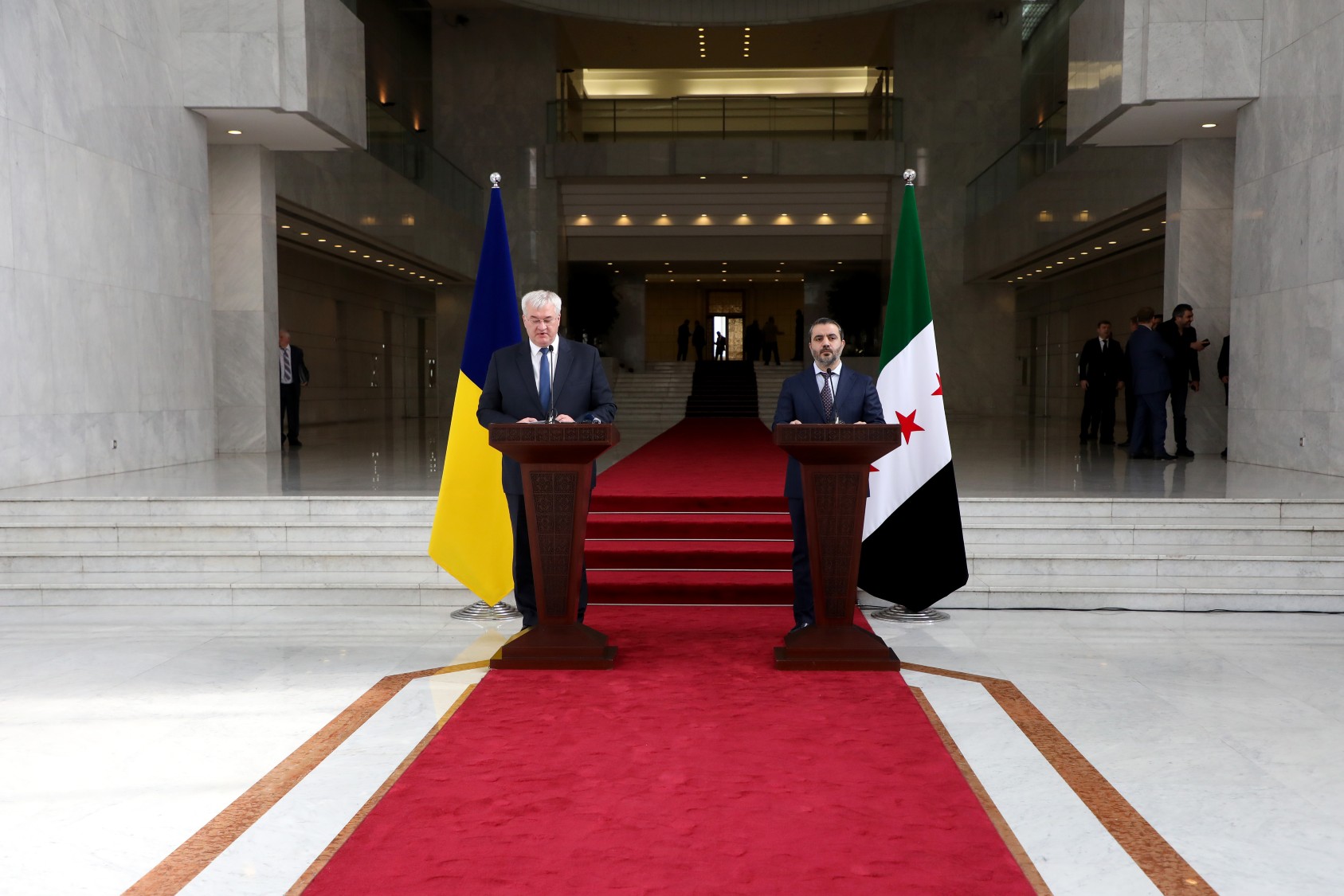Ukraine and Syria: a budding new friendship
Why Zelenskyy's government is rapidly building ties with Russia's former ally in the Middle East

A free daily email with the biggest news stories of the day – and the best features from TheWeek.com
You are now subscribed
Your newsletter sign-up was successful
Ukraine has pledged its support for the interim government in Syria after Kyiv's foreign minister met with his new Syrian counterpart during a visit to Damascus.
The talks between Ukraine's Andrii Sybiha and Syrian Foreign Minister Asaad Hassan al-Shibani (pictured at their press conference, above), signal a shift in relations between the two nations who have each had momentous, if very different, interactions with Moscow in recent years.
What's happened so far?
Ukraine cut diplomatic ties with Damascus in June 2022, after Syria – then a Russian ally and dependent – recognised the "independence" of the Russian-occupied territories in Ukraine's Donetsk and Luhansk regions. But since rebels overthrew the Assad regime last month, Kyiv has been "moving to build ties" with the "new Islamist rulers there", said Reuters.
The Week
Escape your echo chamber. Get the facts behind the news, plus analysis from multiple perspectives.

Sign up for The Week's Free Newsletters
From our morning news briefing to a weekly Good News Newsletter, get the best of The Week delivered directly to your inbox.
From our morning news briefing to a weekly Good News Newsletter, get the best of The Week delivered directly to your inbox.
Volodymyr Zelenskyy has already sent 500 tonnes of wheat flour to Syria, in a humanitarian-aid initiative with the UN World Food Programme. And Kyiv's support would not be "a one-off", said the Agriculture and Food Minister Vitaliy Koval, but "rather long-lasting and predictable". Writing on X, Zelenskyy said that Ukraine supports the Syrian people in "overcoming decades of dictatorial rule" and "restoring stability, security, and normal life".
What is Ukraine looking to get out of it?
Some of Zelenskyy's moves are "raw power play", aimed at "rubbing the Kremlin's nose" in its failure to prevent the fall of Assad, wrote Anne McElvoy, executive editor of Politico, for the i news site. But Kyiv also "glimpses opportunity" in the move: Ukraine can "emerge from victim status" and "assert its own interests" on the world stage. It doing so, it hopes to show that it is "forging its way as an autonomous country, not a satellite or proxy", in defiance of the "grim Putin vision for its future".
A closer relationship with the new regime in Damascus also offers the "added bonus" of useful intelligence on Russian military facilities in Syria.
What does Syria stand to gain?
The most immediate benefit for Syria of a courtship with Ukraine is the prospect of food supplies, which are desperately needed right now. The country is facing a "food security and economic crisis", said The Independent, with around 90% of Syrians living in poverty and, according to the UN, more than half not sure "where their next meal will come from".
A free daily email with the biggest news stories of the day – and the best features from TheWeek.com
On a wider scale, it's also part of a strategy in which Syria is "gradually shifting away" from Russia and Iran and "rekindling ties with Western and Gulf Arab nations that had opposed Assad's rule".
How will a closer alliance affect the world?
It's not yet clear. Speaking to the national Al-Arabiya TV channel, Syria's new de facto leader, Ahmed al-Sharaa, has "hinted" that he will "maintain some contact" with Moscow, said the Kyiv Post. There are "deep strategic interests between Russia and Syria", he said. Syria's arms "are of Russian origin" and "many power plants are managed by Russian experts", so "we do not want Russia to leave Syria in the way that some wish".
Meanwhile, said McElvoy, the "great game" of "alliances stretching from Europe via Turkey to Russia and the Middle East" is entering a new phase. "The consequences will be far-reaching" and possibly unpredictable, but "that is the world as it is".
Chas Newkey-Burden has been part of The Week Digital team for more than a decade and a journalist for 25 years, starting out on the irreverent football weekly 90 Minutes, before moving to lifestyle magazines Loaded and Attitude. He was a columnist for The Big Issue and landed a world exclusive with David Beckham that became the weekly magazine’s bestselling issue. He now writes regularly for The Guardian, The Telegraph, The Independent, Metro, FourFourTwo and the i new site. He is also the author of a number of non-fiction books.